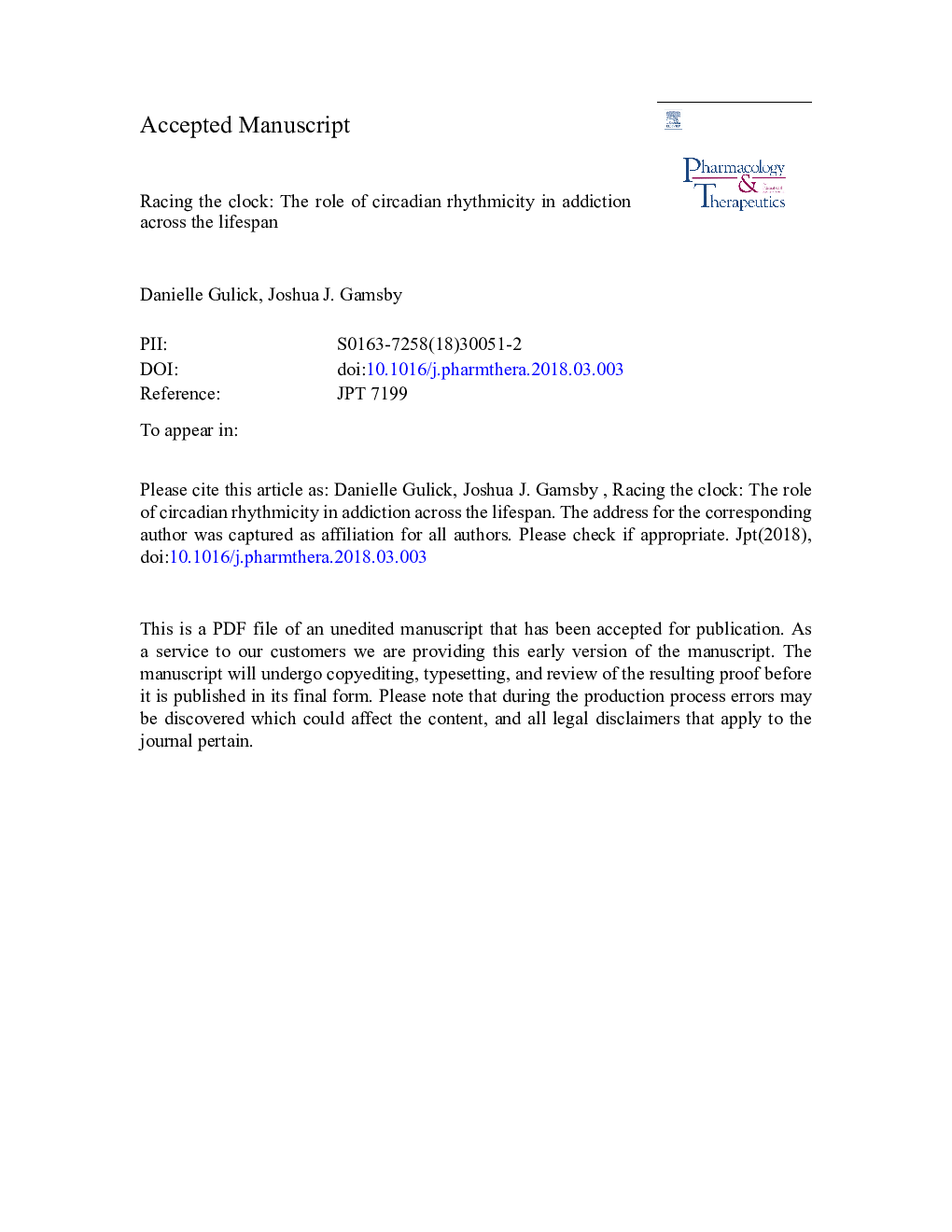| کد مقاله | کد نشریه | سال انتشار | مقاله انگلیسی | نسخه تمام متن |
|---|---|---|---|---|
| 8536789 | 1560917 | 2018 | 58 صفحه PDF | دانلود رایگان |
عنوان انگلیسی مقاله ISI
Racing the clock: The role of circadian rhythmicity in addiction across the lifespan
ترجمه فارسی عنوان
مسابقه ساعت: نقش ریتمیک روزانه در اعتیاد در طول عمر
دانلود مقاله + سفارش ترجمه
دانلود مقاله ISI انگلیسی
رایگان برای ایرانیان
کلمات کلیدی
MAO-AD1RGSK3SCNCK1VTAadvanced sleep phase syndromeN-methyl-d-aspartateNMDAD2RDARPP32TTFLDSPsdopamine type 1 receptorNACBDZPFCASPSAud - آدمdelayed sleep phase disorder - اختلال خواب فاز تاخیرAlcohol use disorder - اختلال سوء مصرف الکلSubstance use disorder - اختلال سوء مصرف موادcircadian rhythm sleep disorders - اختلالات خواب ریتم شبانه روزیgamma-aminobutyric acid - اسید گاما آمینو بوتیریکbenzodiazepine - بنزودیازپینChronotype - تاریخچهSUD - جنوبیper - در هرDopamine - دوپامینdopamine type 2 receptor - دوپامین نوع 2 گیرندهcircadian - دیروزAging - سالخوردگیAlcohol abuse - سوء مصرف الکلSubstance abuse - سوءمصرف مواد مخدرprefrontal cortex - قشر prefrontalPVN - مالیات بر ارزش افزودهmonoamine oxidase A - مونوآمین اکسیداز AHPA - میلی بار یا هکتوپاسکالventral tegmental area - ناحیه تگمنتوم شکمیNucleus accumbens - هسته accumbensparaventricular nucleus - هسته پروژسترویکSuprachiasmatic nucleus - هستههای سوپراکیاسماتیکhypothalamus-pituitary-adrenal - هیپوتالاموس-هیپوفیز-آدرنالSingle nucleotide polymorphism - پلیمورفیسم تک نوکلئوتیدیSNP - چندریختی تک-نوکلئوتیدperiod gene - ژن دورهcasein kinase 1 - کازئین کیناز 1Chronotherapy - کرونوتراپیGABA - گاباglycogen synthase kinase 3 - گلیکوزین سنتاز کیناز 3
موضوعات مرتبط
علوم پزشکی و سلامت
داروسازی، سم شناسی و علوم دارویی
داروشناسی
چکیده انگلیسی
Although potent effects of psychoactive drugs on circadian rhythms were first described over 30â¯years ago, research into the reciprocal relationship between the reward system and the circadian system - and the impact of this relationship on addiction - has only become a focus in the last decade. Nonetheless, great progress has been made in that short time toward understanding how drugs of abuse impact the molecular and physiological circadian clocks, as well as how disruption of normal circadian rhythm biology may contribute to addiction and ameliorate the efficacy of treatments for addiction. In particular, data have emerged demonstrating that disrupted circadian rhythms, such as those observed in shift workers and adolescents, increase susceptibility to addiction. Furthermore, circadian rhythms and addiction impact one another longitudinally - specifically from adolescence to the elderly. In this review, the current understanding of how the circadian clock interacts with substances of abuse within the context of age-dependent changes in rhythmicity, including the potential existence of a drug-sensitive clock, the correlation between chronotype and addiction vulnerability, and the importance of rhythmicity in the mesocorticolimbic dopamine system, is discussed. The primary focus is on alcohol addiction, as the preponderance of research is in this area, with references to other addictions as warranted. The implications of clock-drug interactions for the treatment of addiction will also be reviewed, and the potential of therapeutics that reset the circadian rhythm will be highlighted.
ناشر
Database: Elsevier - ScienceDirect (ساینس دایرکت)
Journal: Pharmacology & Therapeutics - Volume 188, August 2018, Pages 124-139
Journal: Pharmacology & Therapeutics - Volume 188, August 2018, Pages 124-139
نویسندگان
Danielle Gulick, Joshua J. Gamsby,
